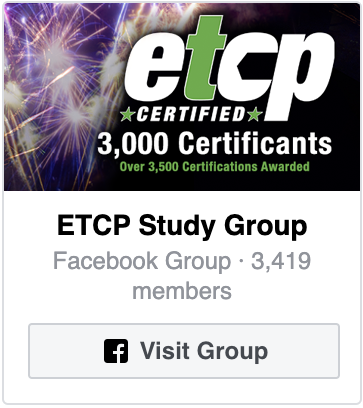| The ETCP Council recognizes that for most individuals who qualify to take any of the certification tests it has been many years since that person has taken a written test. Such unfamiliarity is almost certain to give rise to anxiety and fear of failure. This is only human and to be expected, however, heightened anxiety only hampers a person’s ability to exhibit a positive state of mind when sitting down to answer the 150 questions each examinee must answer.
The two sections below provide tips for dealing with test anxiety and for better test taking. These are suggestions that are probably familiar and reasonable to most persons, but which are helpful to see in writing. Look them over and try to incorporate the points that make sense to you when preparing for the exam. Most likely no one will know all the correct answers, but the questions will all come from the outline provided in the handbook and in agreement with the emphasis noted by percentage in that outline. If it doesn’t appear on the outline, it won’t be on the test.
If by some chance a passing score is not received on this first pass, keep in mind that the Council has made it financially very reasonable to retake the test and provided a span of up to one year to do so at the reduced cost. That allows a person to consider the initial experience as a study guide in how the test is structured and insight into those areas of the body of knowledge that need to be strengthened.
Good luck in this venture. Above all remain confident. The years of experience that qualified you to take the test have certainly already provided you a strong underpinning of knowledge.
Dealing with Test Anxiety
Before the test:
- If possible, contact others who are taking the exam and form a study group. You can divide up the content outline and teach the sections to one another.
- Be prepared - learn the material thoroughly. It is ideal to allow at least two months to prepare for the exam.
- Study a little every day, rather than cramming on only a few days. For best results, study at least one hour per day.
- Create flash cards of hard to remember facts and other information. Have two stacks of cards: One with information you are currently trying to memorize and one with information you have already memorized, but want to keep fresh in your mind. Go through the new flash cards once a day. Review the remaining flash cards several times each week.
- Create study checklists. Refer to the examination content outline in the candidate handbook to identify all of the material that you will be tested on. This checklist will enable you to break your studying into organized, manageable chunks, which should allow for a comprehensive review plan with minimal anxiety. Read your outline in its entirety at least once each week. During the last two weeks before the exam, read your outline every day.
- Read your outline into a tape recorder and play your tape while driving, walking, or during other down time. Listening to the recording over and over will really help in memorizing critical information.
- Use a variety of study resources. Do not rely on a single publication. There are bibliographies which list rigging and electrical books and publications listed at www.estafoundation.org that you might find useful in preparing. Go to “Educational Resources” under “Seminars and Training.”
- Get a good night’s sleep the night before the exam, so you can arrive at the testing center early.
- Don’t go to the exam with an empty stomach. Take it easy on the coffee; it can make you more nervous.
- Be comfortable but alert; relaxed but focused. Try to stay relaxed and confident throughout the test.
If You Find Yourself Tensing
and
Getting Anxious During the Test
- Remember you are in control.
- Take slow, deep abdominal breaths to help you relax.
- Expect some anxiety - use it as a reminder that you want to do your best.
Tips For Better Test Taking
General Test Taking Strategies:
- Read the directions carefully.
- Know how much time is allowed and use it wisely.
- Budget your time - answer questions in a strategic order: first answer the easy questions to build confidence, score points, and mentally orient yourself to vocabulary and concepts. Then go back and answer the more difficult questions. If you go blank on a particular question, skip it and go on.
- Review your test - resist the urge to leave as soon as you have completed all the items. Don’t worry when others finish their test before you do – it’s perfectly OK to take the full amount of time allotted for the test.
Option Strategies:
- Read the question and try to answer in your own words then select the option that most closely matches your answer.
- Try to first eliminate those options you know to be wrong.
- Treat each option as a true-false question, and choose the “most true” option.
- Remember that you are looking for the best answer and not only a correct one.
Guessing Strategies:
- Always guess, especially when you can eliminate options.
- Similar sounding options - one may be correct; choose the best, but eliminate choices that mean basically the same thing.
- Mutually exclusive options - if two options are opposite each other, chances are one of them is correct.
- Pick an option that contains qualifiers or the one that has a longer, more inclusive answer.
- If two alternatives seem correct, compare them for subtle differences – reread the question for more clarifying information.
- Use knowledge from earlier questions you know to help you refine your guess.
|

